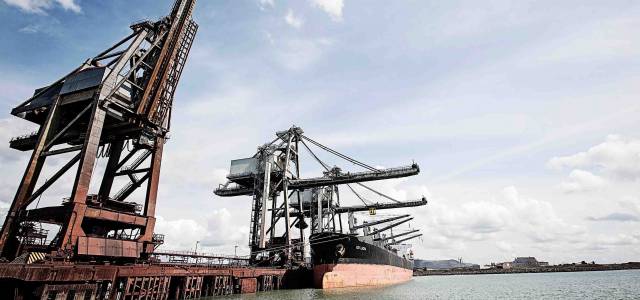#SteelPort - Upgrading infrastructure work at ABP’s port of Newport, south Wales involved an engineering firm from Port Talbot where also located is the giant steelworks of Tata Steel whose 4,000 strong workforce recieved much welcomed news yesterday, writes Jehan Ashmore.
The Welsh workforce were given a commitment to job security and across Tata’s other UK plants according to BBC News. It could bring an end to eight months of uncertainty for thousands of workers who faced losing their jobs when Tata's UK business was put up for sale. Tata held talks with unions yesterday (Wednesday) and said it was "an important step forward" for its future in the UK. But workers still have to agree to pensions changes and will be balloted.
Almost 7,000 people are employed by Tata Steel across Wales, including those in Port Talbot, to read more click here. The port located between Swansea and Barry (see former Seaspeed Ferries) along with Cardiff and Newport make up ABP South Wales five ports handling more than 13 million tonnes of cargo annually. In total Associated British Ports group has 21 ports throughout the UK.
It is at this Bristol Channel port one of only a few harbours in the UK that Port Talbot is capable of handling cape-size vessels of up to 170,000dwt. The two 300m long berth of the deepwater jetty built in the 1970’s is predominantly for importing coking coal, minerals and ores to the Tata plant which is Indian owned.
On the other side of the Celtic Sea, the last such steel works in the Republic was the Irish Steel plant in Cork Harbour. The factory on Haulbowline Island was on a site of a former 1869 dockyard neighbouring the Naval Service Base. The plant’s last owners ISPAT /Irish Steel, also an Indian owned business had a workforce of 400 until closing in 2001 with accumulated losses of £10m.
A legacy of such heavy industry remains as Afloat reported in January of the then Marine Minister Simon Coveney announcment of a two-and-a-half-year programme of core remediation works during a meeting with the Haulbowline Remediation Project Stakeholders Group.
Remediation of the contaminated waste site is to be completed by mid-2018. This followed a Government decision to provide a total of €61 million to remediate the location on a “whole of Island basis”, incorporating both the east and south tips and including a ground level remediation of the former factory site.
The eyesore of the spoil site on the eastern end of Haulbowline Island over the years could easily be seen by tourists on board inbound Brittany Ferries Roscoff-Cork seasonal-only sailings.
Flagship Pont-Aven whose environmental credentials consist of funnel sulphur emission ‘scrubber’ technology which was installed before this season. The 'green' measures were taken so to comply with an EU Directive on Sulphur Emissions.
The Ireland-France seasonal connection has been extended over the years with sailings running up to early November. Sailings on the continental service are to resume in April 2017.






























































